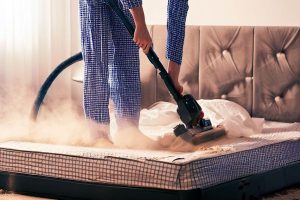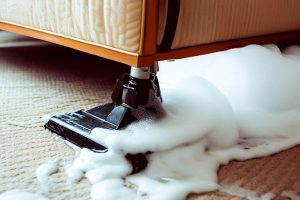“Why Does My Air Mattress Keep Deflating“, you asked? Have you ever had an experience where you wake up in the morning only to find that your air mattress has deflated overnight? It’s a common occurrence and one that can be quite frustrating.
Coincidentally, I’ve recently been doing some research on why air mattresses can deflate unexpectedly, and what you can do to prevent it from happening.
In this Nousdecor article, I’ll be exploring the reasons why air mattresses leak, how to fix them when they do, and how to make sure your bed stays inflated for as long as possible.
Key Takeaways
- Leakage is one of the common reasons why an air mattress might deflate. Cheaper models are more prone to this issue, so it’s important to check for air mattress leaks by submerging the mattress in water and looking for bubbles.
- Improper use or overloading the air bed can also cause it to lose air. It’s essential to follow the manufacturer’s instructions and not exceed the weight limit to prevent your air bed from losing air.
- Temperature changes can affect the air inside the mattress. When the room temperature drops at night, the air condenses, leading to a loss of pressure and a deflated mattress in the morning. Using a mattress protector or choosing a high-quality air mattress with a built-in pump can help prevent this issue.
- Storing your air mattress incorrectly can cause material degradation and create weak spots that lead to air loss. It’s important to store the mattress properly to maintain its lifespan and avoid air mattress deflation.

Why Does My Air Mattress Keep Deflating Overnight
As an air mattress owner, I’ve experienced the frustration of waking up to find my mattress deflated. The culprits behind this issue could be anything from leaking air, temperature changes, and even sleeper weight.
It’s important to understand these key factors in order to avoid having your bed become a pancake by morning.
Air Leaks
Leaks in your air mattress could be the reason why it keeps deflating. When an air mattress is submerged in a bathtub of water, bubbles may appear if there is a leak present. An air leakage can also occur due to improper use or overloading the bed, resulting in material degradation and weaknesses.
To avoid this, make sure to buy a high-quality air pump for your queen size air mattress. Using a self-inflating option can also make setup and maintenance easier. Additionally, investing in protective materials like waterproof covers for your queen air bed can help prevent damage.
Finally, listen closely around your bed to see if you can hear the air escaping from any holes or crevices. If so, patch them up with some adhesive tape or sealant before using the mattress again.
Transitioning into temperature changes…
Temperature Changes
When the temperature drops, the air inside your mattress condenses, causing it to deflate by morning. This issue is especially common with Intex Air pump mattresses, which are lightweight and have less insulation against temperature changes.
If you own an Intex Air Pump mattress or any other type of inflatable air bed that keeps losing air or deflating due to its design, there are a few steps you can take. First, store the mattress away from exterior walls or windows to shield it from extreme temperatures.
Additionally, consider adding a mattress protector, which can help retain heat and prevent deflation due to cold temperatures. Investing in a high-quality inflatable air bed with built-in pumps can also help maintain pressure and prevent leaks overnight.
Sleeper Weight
Sitting on the mattress for too long or exceeding its weight limit can cause your air bed to start losing air. Air mattress vulnerability to bed bugs is as clear as day, so it’s important to use mattress encasements and bed bugs to keep an eye out for any signs of infestation.
Camping mattresses should be carefully inspected before use to avoid chiggers (see mattress chigger control methods). DIY mattress cleaning methods, like vacuuming the mattress regularly, can help prevent bugs from taking over.
Additionally, using specialized products like sprays and dust mite treatments can help control pests and improve the longevity of your air mattress.
To maximize air loss prevention, try rotating the bed every few months and make sure not to exceed its weight limit. This will ensure that your airbed remains in top condition throughout its lifetime, providing you with a comfortable sleep experience night after night without having to worry about deflation!
How to Fix an Air Mattress That Keeps Losing Air
As the owner of an air mattress, I know all too well how frustrating it can be when your bed starts to lose air or deflates overnight. Thankfully, there are a few simple steps you can take to patch any leaks and adjust the room temperature so that your air mattress stays inflated overnight.
From learning how to fix an air leakage with a patch kit, to inflating your mattress with a built-in pump just like alternative non-baking soda mattress stain removal techniques, I’m here to share my tips on how to keep an air mattress from deflating.
Patching Air Leaks
If you suspect an air leakage, one way to find it is by submerging the mattress in a bathtub of water and looking for bubbles. Here are some other ways to patch leaks:
- Investing in a mattress protector or choosing a high-quality air mattress that won’t deflate can prevent leaks while sleeping.
- Preventing mattress mold buildup can help ensure your air bed doesn’t lose its air pressure over time. Fleas and mattress protectors can be effective in this regard.
- Ideal mattress choices like memory foam or latex mattresses can also help keep your air bed from losing air overnight.
- Adjusting the room temperature is important. Cold temperatures cause the air inside your inflatable bed to condense, leading to loss of pressure. Setting the thermostat higher will prevent this from happening and keep your bed inflated all night long.

Adjusting Room Temperature
After checking the mattress for any holes that may have caused an air leakage, I considered another possible explanation for why my air mattress keeps deflating: the temperature in the room.
As temperatures drop overnight, the air inside the mattress condenses and causes it to lose some of its pressure. And if I’m not careful, this can lead to a deflated mattress by morning.
It’s also important to note that whether can foam mattresses get bed bugs or not, it’s important to protect them from infestation.
To avoid this issue with my air mattress, I decided to make sure the room temperature stayed steady overnight and invest in a quality model with a built-in pump. This way, I could ensure that my mattress would remain inflated all night long!
Preventing Air Mattress Deflating
When it comes to air mattresses, prevention is key. One way to prevent your air mattress from deflating is to use a mattress protector. This can help protect the mattress from any kind of wear and tear, and keep it in good condition for longer.
Additionally, choosing a high-quality air mattress with a built-in pump can be a great investment; these mattresses have been designed to maintain their pressure overnight due to their design.
With proper care and maintenance, you can ensure your air mattress will last for years!
Utilizing Mattress Protector
Using a mattress protector will help prevent your air mattress from deflating. Here are two simple steps to keep your air mattress inflated and in top condition:
- Protect: A mattress protector can help guard against dust, dirt, and other particles that can cause wear and tear on the material. It also helps protect against accidental spillages or stains.
- Keep an eye out: Look for signs of wear and tear such as rips, tears, or weak spots on the material. These could indicate a potential leak or weakness in the structure of the bed.
- Store: Make sure you store your airbed correctly when not in use to avoid any deformations or damage to the material.
A mattress protector is an easy way to ensure your air mattress stays inflated overnight. By taking these simple steps, you can help prolong its life and make sure it performs optimally for longer!
Transitioning into the next section about choosing a high-quality airbed with a built-in pump, it’s important to note that buying an expensive model won’t guarantee longevity. Proper care is still essential for maintaining its quality over time.
Choose a High-Quality Air Mattress with Built-In Pump
Choosing a high-quality air mattress with a built-in pump can help prevent your mattress from losing air or deflating. Investing in an inflatable air bed with features such as superior construction materials and an automatic inflation system will provide you with the best return on investment.
With just a single button press, you can easily inflate your air mattress to its full capacity and ensure consistent comfort overnight. It also helps to keep the air pressure regulated, preventing any unexpected loss of air.
| Advantage | Disadvantage |
| Automatic Inflation System | Costly |
| Regulated Air Pressure | Inconvenient Storage |
| Superior Construction Materials | Takes Time to Inflate |
| Consistent Comfort Throughout the Night | Limited Weight Limit for Your Bed |
A good quality air mattress should last for years without developing any holes or leaks, allowing you to get more use out of your purchase. Plus, it’s much easier to maintain your air mattress when it has a built-in pump since it does not require manual inflating every time you use it. Moving on smoothly…
The Lifespan of an Air Mattress
As an owner of an air mattress, I’m always looking for ways to extend its lifespan. But how long can a typical air mattress last?
Well, with proper care and maintenance, most air mattresses have a lifespan of around four to five years. However, there are ways you can extend the life of your mattress even further by taking the right precautions.
These include avoiding overloading or sitting on the mattress, using a protective cover, cleaning it regularly with soapy water, and storing it away from direct sunlight.
Following these tips can help ensure that your air mattress lasts as long as possible.
The Typical Air Mattress Lifespan
Understandably, you’re wondering how long your air mattress will last. The typical lifespan of an air mattress is anywhere from three to five years. To ensure it lasts this long, consider these two factors:
- Maintenance:
- Inspect for leaks regularly.
- Keep clean and dry when not in use.
- Usage:
- Don’t exceed weight limit.
- Avoid sitting or playing on it too much.
Keeping these in mind can help you extend the life of your air mattress and get the most out of its use.
However, if used improperly, it may lose air quickly and need replacement sooner than expected.

How to Extend Mattress Lifespan
By properly maintaining and using your air mattress, you can extend its lifespan. Here are some tips to keep in mind:
- Store your air-mattress in a cool, dry place away from direct sunlight. This will help prevent deterioration of the material.
- Be mindful of the weight limit. Overloading the bed can cause air leakage or deflation.
- If you hear any noise coming from the mattress while lying on it, there may be a leak or hole. Use patch kits to repair any damage.
- Before inflating your air-mattress, check for weak spots. If the material feels thin or worn out, it may be time to replace it.
- When not in use, make sure to deflate your air-mattress completely. Also, keep it away from sharp objects that could puncture the surface.
Taking these steps will ensure that your inflatable bed lasts longer and performs better throughout its life cycle. With careful attention and proper care, you’ll have an inflated air mattress night after night!
Tips to Fix an Air Bed That Keeps Losing Air
If you have an air bed that keeps losing air, there are a few steps you can take to try and fix it.
Firstly, check for any leaks by submerging the mattress in water and looking for bubbles. If it appears to have lost pressure due to improper use or overloading, stop sitting on the mattress and make sure not to exceed its weight limit.
Secondly, look out for holes in an air bed which may be causing air loss. To do so, spread a sheet of soapy water over the surface and see if there are any bubbles forming where air is escaping.
Finally, if all else fails, you should consider buying a new air-mattress with a built-in pump or one of higher quality that won’t deflate because of their design.
To maintain your air-mattress and keep it inflated:
- Cover it with a protective layer when not in use
- Keep away from heat sources like radiators or direct sunlight
- Take care when moving the bed as this can cause small tears
- Regularly inspect all areas for any signs of damage
To inflate it:
- Inflate your mattress by hand using an electric pump or by mouth
- Allow the mattress to sit flat on the floor while inflating
- Hear the air escaping? Stop inflation immediately
To store it properly:
- Store the mattress in its original box instead of folding it up
- Make sure not to leave your inflatable air beds lying flat on surfaces such as concrete floors
Frequently Asked Questions
Conclusion
I’ve learned that air mattresses can leak air for a few different reasons, but the good news is there are ways to fix and prevent this from happening.
With regular maintenance, proper use of the mattress, and using a protective cover, you can extend your mattress’s lifespan and keep it inflated longer.
However, if my air mattress keeps leaking air, I’ll be sure to troubleshoot the issue and take action as soon as possible — before I’m left sleeping on the floor!






